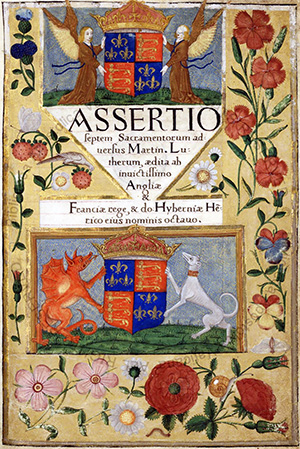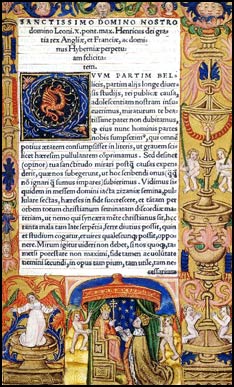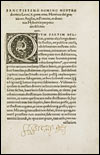|
|
|
|

Title-page from Assertio Septem Sacramentorum
The Vatican Libraries.
Source:
Henry VIII, King of England. Excerpt from "The Defense of the Seven Sacraments".
English History in the Making. Vol I. William L. Sachse, Ed.
New York: John Wiley and Sons, 1967. 182-183.
. . . . . .
 We have in this little book, gentle reader, clearly demonstrated, I hope, how absurdly and impiously Luther has handled the holy sacraments. For though we have not touched all things contained in his book, yet so far as was necessary to defend the sacraments (which was our only design), I suppose I have treated, though not so sufficiently as might have been done, yet more than is even necessary. . . . We have in this little book, gentle reader, clearly demonstrated, I hope, how absurdly and impiously Luther has handled the holy sacraments. For though we have not touched all things contained in his book, yet so far as was necessary to defend the sacraments (which was our only design), I suppose I have treated, though not so sufficiently as might have been done, yet more than is even necessary. . . .
But that others may understand how false and wicked his doctrine is, lest they might be so far deceived as to have a good opinion of him, I doubt not but in all parts there are very learned men . . who have much more clearly discovered the same, than can be shown by me. And if there be any who desire to know this strange work of his, I think I have sufficiently made it apparent to them. For seeing by what has been said, it is evident to all men what sacrilegious opinions he has of the sacrament of our Lord's Body, from which the sanctity of all the other sacraments flow: who would have doubted, if I had said nothing else, how unworthily, without scruple, he treats all the rest of the sacraments? Which, as you have seen, he has handled in such sort that he abolishes and destroys them all, except Baptism alone. . . .
What everybody believes, he alone by his vain reason laughs at, denouncing himself to admit nothing but clear and evident Scriptures. And these, too, if alleged by any against him, he either evades by some private exposition of his own, or else denies them to belong to their own authors. None of the Doctors are so ancient, none so holy, none of so great authority in treating of Holy Writ, but this new doctor, this little saint, this man of learning, rejects with great authority.
Seeing, therefore, he despiseth all men and believes none, he ought not to take it ill if everybody discredit him again. I am so far from holding any further dispute with him that I almost repent myself of what I have already argued against him. For what avails it to dispute against one who disagrees with everyone, even with himself? Who affirms in one place what he denies in another, denying what he presently affirms? Who, if you object faith, combats by reason; if you touch him with reason, pretends faith? If you allege philosophers, he flies to Scripture; if you propound Scripture, he trifles with sophistry. Who is ashamed of nothing, fears none, and thinks himself under no law. Who contemns the ancient Doctors of the church, and derides the new ones in the highest degree; loads with reproaches the Chief Bishop of the church. Finally, he so undervalues customs, doctrine, manners, laws, decrees and faith of the church (yea, the whole church itself) that he almost denies there is any such thing as a church, except perhaps such a one as himself makes up of two or three heretics, of whom himself is chief. . . .
 |
Autographed page from the 1521 Pynson edition of the "Assertio".
©Royal Collection. |
 | to Works of Henry VIII |
Site copyright ©1996-2025 Anniina Jokinen. All rights reserved.
Created by Anniina Jokinen on June 10, 2002. Last updated on March 30, 2025.
|
|
The Tudors
The Parents of Henry VIII
King Henry VII
Elizabeth of York
The Six Wives of Henry VIII
Queen Catherine of Aragon
Queen Anne Boleyn
Queen Jane Seymour
Queen Anne of Cleves
Queen Catherine Howard
Queen Katherine Parr
The Children of Henry VIII
Henry Fitzroy, Duke of Richmond
King Edward VI
Queen Mary I
Queen Elizabeth I
The King's Advisors
Cardinal Thomas Wolsey
Archbishop Thomas Cranmer
Thomas Cromwell
Sir Thomas More
European Monarchs
Margaret Tudor, Queen of Scotland
James IV, King of Scotland
James V, King of Scotland
Mary of Guise, Queen of Scotland
Mary Tudor, Queen of France
Louis XII, King of France
Francis I, King of France
Ferdinand II, King of Aragon
Maximilian I, Holy Roman Emperor
Charles V, Holy Roman Emperor
Popes
Pope Julius II
Pope Leo X
Pope Clement VII
Pope Paul III
English Nobility
Charles Brandon, Duke of Suffolk
Edward Stafford, D. of Buckingham
Thomas Howard, 3rd D. of Norfolk
John Dudley, D. of Northumberland
Thomas Boleyn, Earl of Wiltshire
George Boleyn, Viscount Rochford
John Russell, Earl of Bedford
Thomas, Lord Audley
Richard de la Pole
Thomas Seymour, Lord Admiral
Edward Seymour, Protector Somerset
Clergy
Cardinal Lorenzo Campeggio
Cardinal Reginald Pole
Bishop Stephen Gardiner
Edmund Bonner, Bishop of London
Nicholas Ridley, Bishop of London
John Hooper, Bishop of Gloucester
John Aylmer, Bishop of London
John Fisher, Bishop of Rochester
Archbishop William Warham
Richard Fox, Bishop of Winchester
Edward Fox, Bishop of Hereford
William Tyndale
Hugh Latimer
William Grocyn
Thomas Linacre
Historical Events
The Battle of the Spurs, 1513
Field of the Cloth of Gold, 1520
Dissolution of Monasteries, 1536-40
Pilgrimage of Grace, 1536
The Siege of Boulogne, 1544
The Sweating Sickness
Tudor Legal System
Common Law
Court of Common Pleas
Court of King's Bench
Court of Star Chamber
Council of the North
Attainder
Oath of Supremacy
The Act of Supremacy, 1534
The Act of Succession, 1534
The Ten Articles, 1536
The Six Articles, 1539
Royal Residences
Greenwich Palace
Hatfield House
Richmond Palace
Windsor Palace
Tudor Literature
See section
16th-century Renaissance English Literature
More at Encyclopedia
|
|